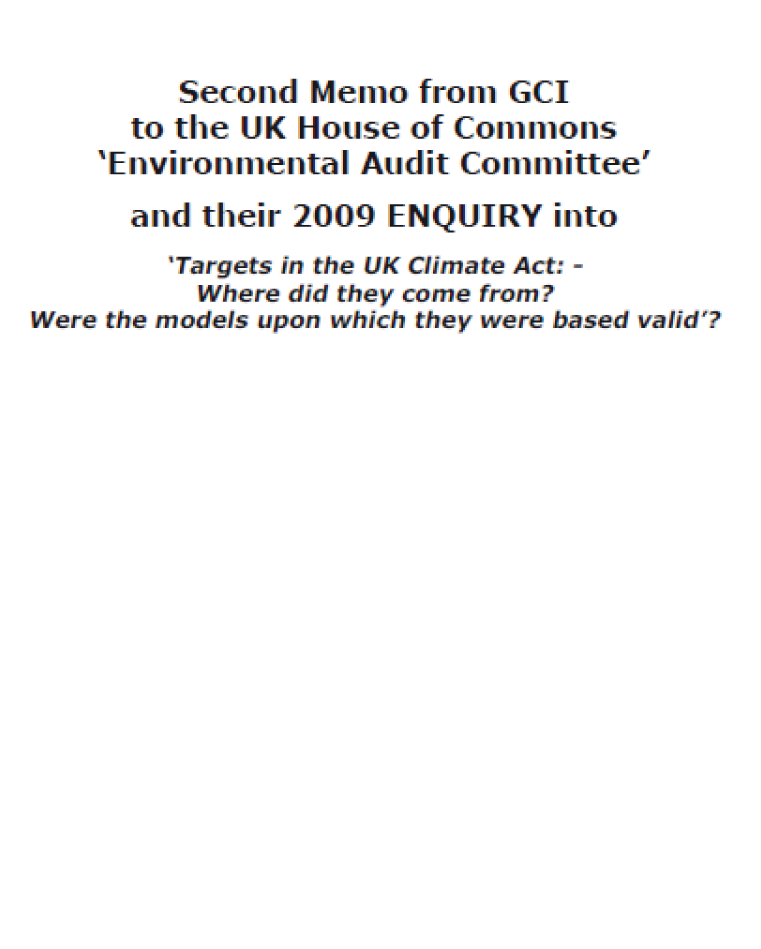UK House of Commons Environmental Audit (Select) Committe Hearing (2009)
Minister Ed Miliband's actions followed (see below) . . . .
CCC Chairman Adair Turner on C&C forming the basis of the UK Climate Act
HMG's UK Climate Act (UKCA 2008) is C&C (Right Principle, Wrong Rates)
Adair Turner was Chairman of the UK Climate Change Committee created as part of the UK Climate Act in 2008.
In 2009, he said to camera in an EAC session that C&C is the basis of the UK Climate Act (UKCA).
Adair Turner to the Energy & Climate Change Committee (Right Principle Right Rates)
Colin Challen:
"I think that your pragmatic support for Contraction and Convergence is very welcome, certainly on my part anyway, and it is on the record at a meeting of the EAC that you do see this as being roughly the way we are headed. Would you accept that, as the speed of contraction accelerates as it seems likely that we will have to go down that route, the speed of acceleration of convergence will also have to pick up?"
Lord Turner of Ecchinswell:
"Yes, I think that you are right, and it does raise a very complex issue of international negotiations, in particular in relation to China.
In general, however, you must be right, yes."
********************************************************
The following are his words to the UK Environmental Audit (Select) Committee (EAC) in 2009 on the global
contraction & convergence methodology adopted in the UK Climate Act to set the UK national target.
********************************************************
Adair Turner
“When we proceed from the global target to the UK target, we are suggesting something that is reasonably pragmatic close to ‘contract & converge’.
And I think it is important to realize that actually, although people get very worked up about precise methodologies – contract & converge, triptych etc –
it is very difficult to imagine a long-term path for the world which isn’t somewhat related to a contract & converge type approach.”
Joan Walley MP EAC Member
“But what I don’t understand is that if that’s the case and what you are doing is more-or-less contraction and convergence, given the scale of the need
for education for the whole planet to understand the scale of the challenge, wouldn’t it make sense for you to come out publicly and endorse it properly . . .
Adair Turner
“Well I think . . . "
Joan Walley
“Or have you have you just done something . . .
Adair Turner
“No, no - I think we have really, I mean I think we have . . .
Joan Walley
“!!! . . "
Adair Turner
“I mean we didn’t call it contract & converge – apart from anything else, for some reason that I don’t quite understand, this has ended up in a emotive sense for one –
it also it gets interpreted in particular ways – but I think we have made a very clear statement that we cannot imagine a global deal
that is both doable and fair
which doesn’t end up by mid-century with roughly equal per capita rights to emit and that is said clearly in the Report.”
Joan Walley
“So sorry . . . if Aubrey Meyer were producing a sequel to the book he has already written,
would he have something written by you on the back-page endorsing contraction & convergence?”
Adair Turner
“I think . . . I think . . . if Aubrey Meyer read the words that I have said, he’d be willing to put those on the back of his book
because they are pretty strong support in principle for what he is saying.”
Colin Challen:
"I think that your pragmatic support for Contraction and Convergence is very welcome, certainly on my part anyway, and it is on the record at a meeting of the EAC that you do see this as being roughly the way we are headed. Would you accept that, as the speed of contraction accelerates as it seems likely that we will have to go down that route, the speed of acceleration of convergence will also have to pick up?"
Lord Turner of Ecchinswell:
"Yes, I think that you are right, and it does raise a very complex issue of international negotiations, in particular in relation to China.
In general, however, you must be right, yes."
specific text
GCI referred to this in the related EAC Enquiry into Carbon Budgets

GCI Evidence to Enquiry by the UK House of Commons Environmental Audit Committee [EAC 2009]
"'Targets in the UK Climate-Act: Where did they come from; were the models on which it is based valid?" showed they came from C&C and successfully challenged HMG and the Met Office on the 'odds' of their targets keeping within '2 degrees' global temperature rise with what became the UK Climate Act in 2008.
~~~~~~~~~~~~~~
In evidence taken by the DECC Committee from Adair Turner in March 2009,
he agreed with proposition that
- if for reasons of urgency that rate of Contraction had to be accelerated,
- then for reasons of equity the rate of Convergence had to be accelerated relative to that.
However, for the rest of the year, evidence from CCC and the UKMO and letters from Adair Turner Ministers at DECC resisted this, simply saying that all feedback warnings had been heeded and all feedback effects had been modelled. This was incorrect as DECC confirmed by letter in 2016.
Analysis of the CCC position shows that contrary to these claims, in the 'political modelling' done for the CCC and the Climate Act,
contradicting the evidence of failing sinks the UK Met Office falsely claimed that sink-efficiency will increase dramatically from 2050 onwards.
This extraordinary claim was what the EAC enquiry really turned on.
~~~~~~~~~~~~~~~~~~~~~~~~~~~~~~~
Ed Miliband - "a little inexperienced . . . "
Ed Milliband had no comprehension of all this when he was the Minister at the UK Department of Environment and Climate Change [DECC]
at the time of the EAC Enquiry and he oversaw the introduction into law of the UK Climate-Act in 2008.
Ed Miliband gave evidence to the Environmental Audit Select Committee [EAC] at the end of the Enquiry in October 2009, more than a year after
the Climate Act had been in force and on the eve of taking the rates of C&C in the UK Climate-Act to COP-15 in Copenhagen in December 2009.
This prescription became known as the 'Danish Draft' and it was put forward by a group of Governments led by the UK,
who claimed it would avoid exceeding an overal temperature rise of two degrees Celsius above pre-industrial.
The EAC Chairman Tim Yeo MP asked him, "Will C&C feature in the negotiations at COP-15?"
"I think probably not is the answer," replied Mr Miliband. He went on, "I do not think that will form the basis of an agreement. I think that there is a sort of attractive justice element to the contraction and convergence idea. The complexity of it, though, is what is the point at which convergence takes place and what do we say about different countries' levels of growth at that point, GDP, how should we adjust for different weather conditions and all that?
Ed Miliband appeared to be completely unaware that a convergence date of 2050 had already been turned into UK Law with UK Climate Act, an act largely scripted by DECC and the Climate Change Committee. He was also apparently unaware that the Chinese Government had proposed immediate convergence of emissions entitlements in July 2009.
Introduced to him afterwards by David Chaytor MP, Mr Milliband asked what I wanted. Not knowing what to say in response I said,
"I thought your evidence betrayed you as a little inexperienced." Unsurprisingly perhaps, he stormed out of the room.
He was obvioulsy unaware of the flaws in the technical work of the UKMO in setting up the budget on which the UK Climate Act is based.
But Mr Miliband then went further than that. He came home from the fiasco at COP-15 that he and DECC largely caused with their
inflammatory C&C prescription & using the Guardian newspaper, publicly accused the Chinese Government of having wrecked
the COP-15 negotiations,
because they had rejected DECC's convergence rate.
Just before they were closed down by the Conservative when they came to power,
DECC
did finally confirm in 2016
that most feedbacks had been omitted from the climate modelling in 2009, when Mr Miliband said & did all the above.
The obvious scientific and political falsity of the UK Government's claims to satisfy the demands of equity and urgency
with this prescription more than explain why the whole thing was rejected outright by Developing Country Governments.
